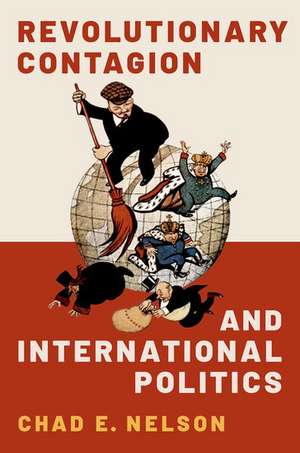Revolutionary Contagion and International Politics
Autor Chad E. Nelsonen Limba Engleză Paperback – 12 oct 2022
Preț: 164.59 lei
Preț vechi: 189.14 lei
-13% Nou
Puncte Express: 247
Preț estimativ în valută:
31.50€ • 34.20$ • 26.46£
31.50€ • 34.20$ • 26.46£
Carte disponibilă
Livrare economică 21-27 martie
Livrare express 15-21 martie pentru 51.26 lei
Preluare comenzi: 021 569.72.76
Specificații
ISBN-13: 9780197601938
ISBN-10: 0197601936
Pagini: 288
Dimensiuni: 234 x 154 x 16 mm
Greutate: 0.44 kg
Editura: Oxford University Press
Colecția OUP USA
Locul publicării:New York, United States
ISBN-10: 0197601936
Pagini: 288
Dimensiuni: 234 x 154 x 16 mm
Greutate: 0.44 kg
Editura: Oxford University Press
Colecția OUP USA
Locul publicării:New York, United States
Recenzii
Using historical examples, Nelson (Brigham Young Univ.) develops a theory of international relations centered on ideological conflicts between states that originate from an established state's fears that a revolutionary movement in a foreign state will spread to its borders and threaten the status quo...The book's detailed analysis of these case studies is a worthwhile contribution to the vast literature theorizing the causes of revolution, how revolution spreads, and the subsequent reaction.
This book greatly advances our understanding of when relations among international ideological enemies are likely to be hostile. The argument is of high importance for both theory and policy, including helping to predict the likelihood of a coming ideological clash between the United States and China." -Mark L. Haas, Duquesne University, and author of Frenemies
Nelson gives us the deepest and broadest treatment yet of how fears of revolutionary contagion affect international relations. By elucidating mechanisms and examining historical cases with care, he shows how governments that fear a revolution is coming their way become hostile to the source country and find new and unexpected foreign allies to combat it. A convincing and timely book." -John Owen, University of Virginia
In this lucid and historically rich book, Nelson breaks important new ground in our understanding of how ideology shapes cooperation in international relations. By drawing attention to the conditions that give rise to leader fears of revolutionary contagion, Nelson forcefully and convincingly goes beyond standard accounts to systematically demonstrate the critical role of domestic politics in explaining how ideology affects alignment between states across history. In sum, this book is a brilliant addition to the study of international relations." -C. William Walldorf, Jr., Wake Forest University
This book greatly advances our understanding of when relations among international ideological enemies are likely to be hostile. The argument is of high importance for both theory and policy, including helping to predict the likelihood of a coming ideological clash between the United States and China." -Mark L. Haas, Duquesne University, and author of Frenemies
Nelson gives us the deepest and broadest treatment yet of how fears of revolutionary contagion affect international relations. By elucidating mechanisms and examining historical cases with care, he shows how governments that fear a revolution is coming their way become hostile to the source country and find new and unexpected foreign allies to combat it. A convincing and timely book." -John Owen, University of Virginia
In this lucid and historically rich book, Nelson breaks important new ground in our understanding of how ideology shapes cooperation in international relations. By drawing attention to the conditions that give rise to leader fears of revolutionary contagion, Nelson forcefully and convincingly goes beyond standard accounts to systematically demonstrate the critical role of domestic politics in explaining how ideology affects alignment between states across history. In sum, this book is a brilliant addition to the study of international relations." -C. William Walldorf, Jr., Wake Forest University
Notă biografică
Chad E. Nelson is an Assistant Professor of Political Science at Brigham Young University. His research interests include the international effects of revolutions, ideology and international politics, and the rise of great powers.
